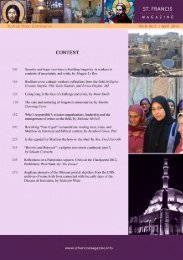download the pdf - St.Francis Magazine
download the pdf - St.Francis Magazine
download the pdf - St.Francis Magazine
You also want an ePaper? Increase the reach of your titles
YUMPU automatically turns print PDFs into web optimized ePapers that Google loves.
<strong>St</strong> <strong>Francis</strong> <strong>Magazine</strong> Vol 8, No 4 | August 2012<br />
o<strong>the</strong>r, non-scripturated religious desires elsewhere among <strong>the</strong> nations.<br />
21 Care is required lest any “fallacy” arising from “a deduction<br />
from <strong>the</strong> assumption that Jesus could have become incarnate in any<br />
culture” leads to <strong>the</strong> suggestion that ‘we should seek to “incarnate”<br />
<strong>the</strong> gospel in Islamic culture.’ (Waterman 2007: 61) Clearly <strong>the</strong><br />
gospel can grow in different and alien cultural settings (see, e.g.,<br />
Gefen (2007) regarding <strong>the</strong> origins of <strong>the</strong> Easter festival and Massey<br />
(2004b) concerning <strong>the</strong> etymology of ‘God’), but terms such as<br />
‘incarnational’ provide a slippery basis for argumentation if <strong>the</strong>y are<br />
loosed from salvation-historical moorings (Grafas 2007b).<br />
Increasingly in this period, C5 proposals were also being criticised<br />
for lacking a robust biblical basis. Part of <strong>the</strong> problem was <strong>the</strong><br />
level of biblical exegesis being employed at this stage in <strong>the</strong> debate.<br />
Often it was isolated and shallow, and still open to <strong>the</strong> charge of<br />
proof-texting.<br />
A survey of <strong>the</strong> various appeals made to texts in 1 Corinthians<br />
demonstrates <strong>the</strong> diversity of appeals to sections of <strong>the</strong> letter, and<br />
<strong>the</strong> relative isolation of resultant argumentation from o<strong>the</strong>r appeals<br />
to elsewhere in <strong>the</strong> epistle. Perhaps most appeal has been made to 1<br />
Corinthians 9:19-23. Massey cited it as evidence of God’s unpredictability<br />
(1999) and as supporting converts staying in <strong>the</strong>ir community<br />
for as long as possible (2000b: 8-9). Caldwell (2000: 28) saw<br />
it as justifying a clear differentiation of culture from religion as analytic<br />
categories, and as implying a flexibility regarding matters of<br />
purity. DeNeui (2005: 416) made similar use of this passage in his<br />
defence of C5. Woods (2003) demurred from such conclusions, noting<br />
that Paul did not adopt anti-Christian practices from Judaism,<br />
nor did he cease to be ethnically a Jew. 22 For Woods, Paul’s stance<br />
contrasts with that of C5 in that his beliefs were not concealed,<br />
whereas C5 has <strong>the</strong> potential to lead towards C6. Woods also raised<br />
21 Schlorff does not refer to ‘subversive fulfilment’, but this term chimes with<br />
Schlorff’s overall <strong>the</strong>sis (2006: 103-136).<br />
22 Both <strong>the</strong>se points raise fur<strong>the</strong>r questions concerning <strong>the</strong> essential nature of<br />
Judaism, and <strong>the</strong> degree of fixity and flex within categories of ethnicity, questions<br />
beyond <strong>the</strong> span of this review.<br />
<strong>St</strong> <strong>Francis</strong> <strong>Magazine</strong> is a publication of Interserve and Arab Vision 469







![Reflections on Surah Fatiha and the Lord's Prayer[1] - St.Francis ...](https://img.yumpu.com/49377951/1/184x260/reflections-on-surah-fatiha-and-the-lords-prayer1-stfrancis-.jpg?quality=85)









